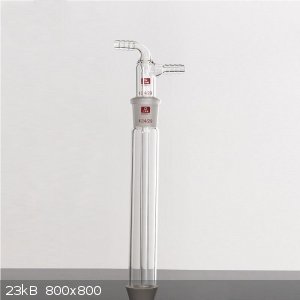
LuckyWinner - 3-3-2021 at 17:27
trying to build a secure liquid transfer system.
I thought about using 4 -6mm teflon tubing which is connected
to the chemical bottle, then to a 2 way teflon valve and then to the reaction vessel.
this teflon tube is getting secured to a teflon compression valve which
is getting opened and closed by a servo motor and some 3D printed support frames.
2 way teflon valve example
https://www.gpescientific.co.uk/brands/bohlender-ptfe-pfa-fe...
------------------------------------------------
2 way teflon valve example ^2
https://www.amazon.com/PARKER-PTFE-Ball-Valve-Inline/dp/B007...
------------------------------------------------
Simple DIY Servo Valve - 3D Printed
https://youtu.be/S8OJ38VGYcc
the problem is that these teflon compression fitting valves from reputable chemical companies cost 600+ USD
for 1x unit... ridiculous...
can anyone recommend a specific teflon 4mm/ 6mm compression fitting with valve that
will not leak under pressure/vaccum?
teflon tube is very rigid and it cant be pulled over a barb hose like silicone tubing,
thus the compression fitting.
wxyz - 3-3-2021 at 17:55
You can use common stainless compression fittings and valves for plastic tubing, if you are willing to restrict yourself to chemicals compatible with
316 stainless steel. (Swagelock, or Parker for example).
Another alternative is using nylon valves. Much cheaper, but attacked by some organics.
But the best solution is probably to use glass syringes with Luerlock fittings to PTFE tubing. That's the standard way of transferring air sensitive
reagents: suck up the reagent with the syringe and then pump into the reaction vessel. Using PTFE septa on the bottles transferring to/from
Oh yeah, just remembered:if you really want to pump stuff buy a Metrohm Dosimat (used for automatic titration and KF water content test) used on eBay.
Get one that's not working (i.e. cheap) for parts. It has everything you need: a motor driven syringe, PTFE tubing and connections, a switch for
switching the syringe pump between vessels. All surfaces are either glass or PTFE. The only problem is that it probably wont handle a vacuum or high
pressure.
[Edited on 4-3-2021 by wxyz]
Fyndium - 4-3-2021 at 02:32
Do they make valves out of PE or PP? They're amazingly resistant to almost anything that's not too oxidizing.
Prior to that, I use the cold trap adapter from my coldfinger paired with any flask I want, including the reaction vessel itself directly to suction
and transfer liquids. You can put PTFE tubing to the suction/injection tubing, and to the outlet you can use ordinary silicon tube and put a primer
hand pump to the end of it to use either suction of pressure. I use this setup almost daily to transfer liquids, suck out bottom layers from vessels,
emptying reaction vessels mounted too good to be moved(overhead stirrers and stuff) etc.

